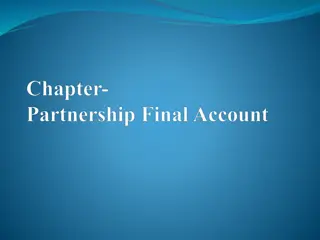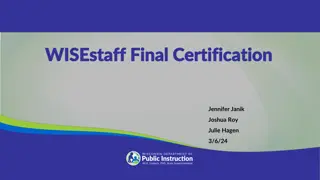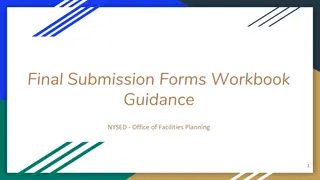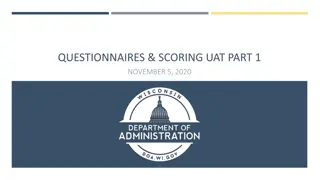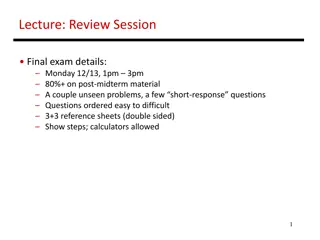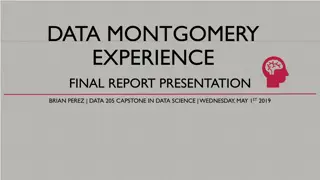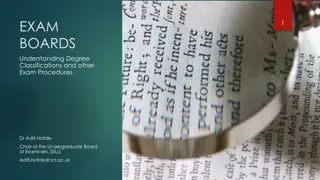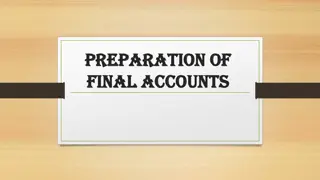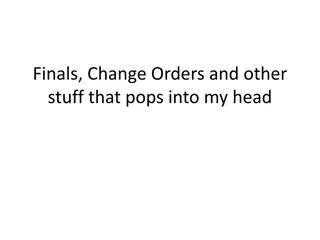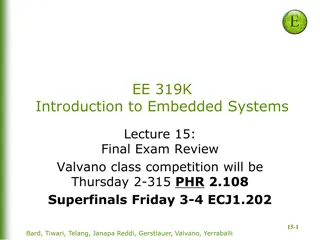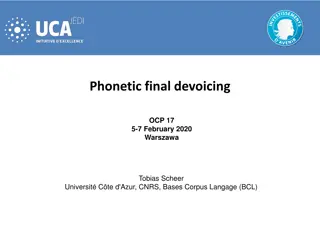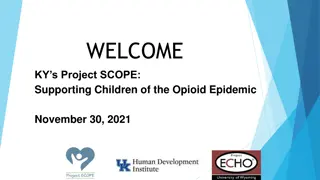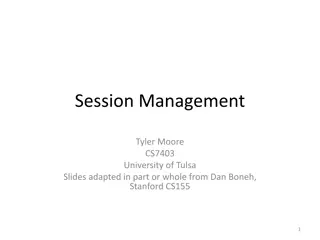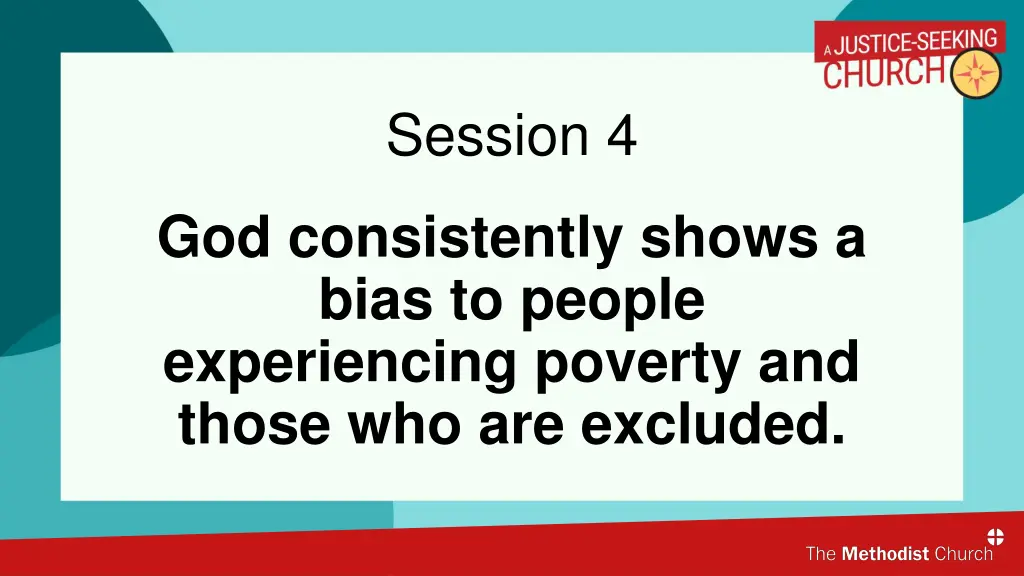
God's Bias Towards Poverty: A Call to Recognize and Address Injustice
Explore the consistent bias of God towards those experiencing poverty and exclusion. Reflect on challenging injustice, valuing all individuals, and making a positive impact in the lives of others. Embrace the message of love and empathy in overcoming societal burdens.
Uploaded on | 3 Views
Download Presentation

Please find below an Image/Link to download the presentation.
The content on the website is provided AS IS for your information and personal use only. It may not be sold, licensed, or shared on other websites without obtaining consent from the author. If you encounter any issues during the download, it is possible that the publisher has removed the file from their server.
You are allowed to download the files provided on this website for personal or commercial use, subject to the condition that they are used lawfully. All files are the property of their respective owners.
The content on the website is provided AS IS for your information and personal use only. It may not be sold, licensed, or shared on other websites without obtaining consent from the author.
E N D
Presentation Transcript
Session 4 God consistently shows a bias to people experiencing poverty and those who are excluded.
What worries you about the future? What helps you feel better about the future?
God who shares life with us to the full, You were born into the poverty of the stable and the wealth of a loving family. You lived as a homeless wanderer and found a home in people s hearts. You died a death of exclusion and stigma and live in the riches of limitless love.
Show us how to recognise both poverty and wealth. Guide us to value people as your children, irrespective of their status. Help us to challenge injustice and its link to poverty. Give us the courage to share Christ s poverty and marginalisation as we share in the infinite resource of his love. Amen. Amen.
Take one or two coins from the bag. As you hold it, consider: what might have been bought with these coins, what impact they might have had over the years, how they could be used to make a difference to people s lives.
Jesus said you always have the poor with you (Mark 14:7). God in the Bible consistently shows a bias to people experiencing poverty and those who are excluded; God has a particular concern for people living with poverty, longing to see them overcoming their burdens. The stories we explore here consider why people are poor. What is the impact of gender, disability, isolation or economic instability? What structural and practical changes can be made to reduce or remove stigma and deprivation?
What support do asylum seekers receive on a weekly basis? What would you most want to buy with the funds available? Write a shopping list. Reflect on what these choices tell you about your priorities.
Film What did you hear that surprised or encouraged you?
Film Kerry talks about the challenge of presuming that poverty is out there rather than within our own community s experience. What have been your own experiences of poverty? Do you feel close to or distant from understanding poverty? Inderjit talks about Scripture showing us that God gives priority (or bias, in the words of the Principle) to people who are excluded. What stories or passages in the Bible help you to understand this? Inderjit talks about Jesus saying the poor you will always have with you . How does this idea challenge or help you?
And Mary said, My soul magnifies the Lord, and my spirit rejoices in God my Saviour, for he has looked with favour on the lowliness of his servant. Surely, from now on all generations will call me blessed; for the Mighty One has done great things for me, and holy is his name. His mercy is for those who fear him from generation to generation.
He has shown strength with his arm; he has scattered the proud in the thoughts of their hearts. He has brought down the powerful from their thrones, and lifted up the lowly; he has filled the hungry with good things, and sent the rich away empty.
He has helped his servant Israel, in remembrance of his mercy, according to the promise he made to our ancestors, to Abraham and to his descendants for ever. Luke 1:46-55
How does Marys song help you make sense of the phrase God s bias to the poor ? Is this idea challenging, comforting, or both? Does the Church and its people need to sing songs of lament at the ongoing authority of the proud, powerful and rich? What would a church be, and do, if it chose to call itself Magnificat Church ? How might the echoes of the Magnificat be amplified in the life of the church and of individual Christians?
Watch a presentation of the Magnificat. Try and write your own modern Magnificat.
When Ruth and Naomi came to Bethlehem, the whole town was stirred because of them; and the women said, Is this Naomi? She said to them, Call me no longer Naomi, call me Mara, for the Almighty has dealt bitterly with me. I went away full, but the Lord has brought me back empty; why call me Naomi when the Lord has dealt harshly with me, and the Almighty has brought calamity upon me?
So Naomi returned together with Ruth the Moabite, her daughter- in-law, who came back with her from the country of Moab. They came to Bethlehem at the beginning of the barley harvest. Now Naomi had a kinsman on her husband s side, a prominent rich man, of the family of Elimelech, whose name was Boaz. And Ruth the Moabite said to Naomi, Let me go to the field and glean among the ears of grain, behind someone in whose sight I may find favour. She said to her, Go, my daughter. So she went. She came and gleaned in the field behind the reapers. As it happened, she came to the part of the field belonging to Boaz, who was of the family of Elimelech.
Just then Boaz came from Bethlehem. He said to the reapers, The Lord be with you. They answered, The Lord bless you. Then Boaz said to his servant who was in charge of the reapers, To whom does this young woman belong? The servant who was in charge of the reapers answered, She is the Moabite who came back with Naomi from the country of Moab. She said, Please let me glean and gather among the sheaves behind the reapers. So she came, and she has been on her feet from early this morning until now, without resting even for a moment. Ruth 1:19b 2:7
What factors make Ruth poor? What enriches her life? How far would these factors have a similar impact in the communities you re familiar with? The outcome of Ruth s story is shaped by the social context of her time. If this were a story told today, how might it present ways in which a poor foreign woman could find recognition and integration to enable her to contribute to a flourishing community? Where do you see God at work for justice in this story?
As you consider Ruths story, place blocks in the Positive or Negative boxes to reflect positive and negative aspects of her situation. What changes or different situations might make it possible to move a block from negative to positive ?
For the kingdom of heaven is like a landowner who went out early in the morning to hire labourers for his vineyard. After agreeing with the labourers for the usual daily wage, he sent them into his vineyard. When he went out about nine o clock, he saw others standing idle in the market-place; and he said to them, You also go into the vineyard, and I will pay you whatever is right. So they went. When he went out again about noon and about three o clock, he did the same. And about five o clock he went out and found others standing around; and he said to them, Why are you standing here idle all day? They said to him, Because no one has hired us.
He said to them, You also go into the vineyard. When evening came, the owner of the vineyard said to his manager, Call the labourers and give them their pay, beginning with the last and then going to the first. When those hired about five o clock came, each of them received the usual daily wage. Now when the first came, they thought they would receive more; but each of them also received the usual daily wage. And when they received it, they grumbled against the landowner, saying, These last worked only one hour, and you have made them equal to us who have borne the burden of the day and the scorching heat.
But he replied to one of them, Friend, I am doing you no wrong; did you not agree with me for the usual daily wage? Take what belongs to you and go; I choose to give to this last the same as I give to you. Am I not allowed to do what I choose with what belongs to me? Or are you envious because I am generous? 16So the last will be first, and the first will be last. Matthew 20:1-16
What power does the landowner have, and where does it come from? What power do the labourers have, and where does it come from? In what ways might God approve of the actions of the landowner? What is there in these actions which might displease God? It s sometimes claimed that poverty is associated with moral failings such as idleness. In light of this parable, how would you respond? How do we currently make decisions about our church resources to respond effectively to poverty?
As either: Someone who worked all day Or Someone who began work in the afternoon Discuss whether what has happened is fair and just.
Do you feel a discomfort about how you or others try to help people experiencing poverty if so, why? What do you think God might be saying to you through this discomfort? What does God s bias to people experiencing poverty mean for us and our church and how we use our resources? What should the relationship look like between people living with poverty and those living with greater affluence?
Watch the film about Street Banquet, a Church at the Margins in Birmingham. What does this community say about God s bias to people in poverty?
One human family God has made, and all for each to care. One world, to be the home of all, with all its wealth to share. One Christ, to manifest on earth love s ultimate design. One Church to know the mystery of broken bread and wine. One race, one world - yet torn apart, we spurn the way of love. But still ahead, the Christ leads on and calls his Church to move from love of power to power of love, to give the word to all to trust the love that conquered death outside the city wall.
And are we brave enough to join with that great company the cost not less than all we have and are or hope to be the bitter cup of human sin to drink with him who died, and take his love outside the wall to all the crucified? Claim him who claims us for his own, to share his pain and grief, to bear the scars that stamp us his - the hallmark of belief. As partners of the living Christ, who risk the path he trod, with wondering love we find we share the timeless joy of God.
Create a banner of hope for a world where poverty no longer exists. Write or draw on a square of paper what your local community would be like if poverty ended.
What does poverty look like in your area at the moment, and how do you know? Share what you know about your area. From these conversations, identify an action or commitment that the group will undertake before it next meets.
Lord of all, who enriches our whole life with your generous love, Take the poverty of our action Take the limitations of our imagination Take the smallness of our ideas And transform them through the riches of your grace And the power of your Spirit As we learn to live as your children and grow into the people you made us to be Alive to each other s needs And depending on the life- changing power of your Son Until your whole creation flourishes And your will is done. Amen.
Share your roll or small loaf with celebration, as a sign of God s power to create plenty from small beginnings.


